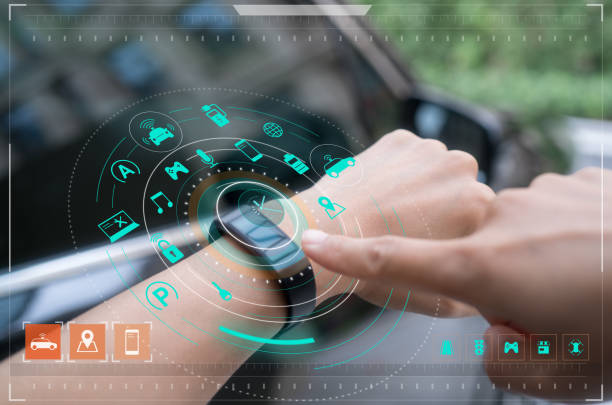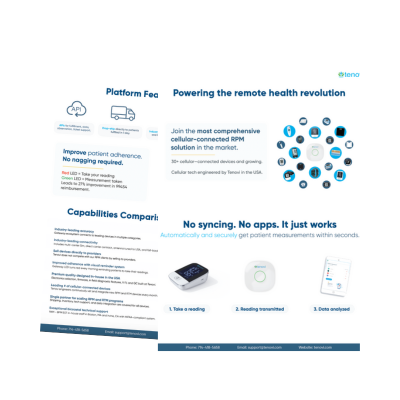Connected health tools also known as smart meter devices are changing the way patients and providers approach care. These advanced wearables track steps or sleep but also capture precise biometric data and transmit it in real time to their healthcare team. This regular health data allows clinicians to make faster, more informed decisions.
From managing chronic conditions to enabling hospital-at-home programs, smart wearables are shaping the future of remote patient monitoring. Below, we explore ten emerging smart meter device technologies that collect, analyze, and allow healthcare teams to act on health data.
1. Smart Blood Pressure Meters
Remote hypertension management is now more precise thanks to smart meter blood pressure devices. These Bluetooth- or cellular-enabled cuffs automatically transmit readings to clinicians through secure platforms, supporting real-time care adjustments. Devices like the Omron, A&D Medical, Welch Allyn and Tenovi offer easy setup and EHR integrations.
2. Glucose Smart Meters
Continuous glucose monitors (CGMs) like the Dexcom G7 and Abbott FreeStyle Libre 3 are smart meter devices for diabetes management. These devices deliver data to healthcare teams every few minutes. These tools are vital for preventing spikes and crashes and reduce the need for fingersticks.
3. Smart Watches for Health Tracking
Smartwatches have gone well beyond fitness tracking. Devices like Apple Watch Series 9 and Samsung Galaxy Watch6 include FDA-cleared ECG capabilities, making them smart meter wearables for cardiac care. These watches monitor heart rate variability, detect arrhythmias, and even support remote diagnostics.
4. Smart Meter Respiratory Monitors
For people with COPD, asthma, or recovering from COVID-19, smart meter respiratory devices provide vital real-time lung function data. Tools like the Tenovi’s Peak Flow Meter, Spire Health Tag and NuvoAir’s home spirometer help detect breathing irregularities early and guide clinical intervention.
5. Smart Sleep Trackers
Sleep disorders are often underdiagnosed, but smart meter devices are making home sleep monitoring and assessment easier. The Withings Sleep Analyzer and Oura Ring track REM cycles, snoring, oxygen saturation, and more.
6. Sensor-Enabled Smart Clothing
Yes, your clothes can now function as smart wearables. Companies like Hexoskin and Myant Skiin have developed textiles that track ECG, respiration, activity, and temperature—blending biometric monitoring into daily life without bulky devices.
7. Smart Meter Devices for Medication Adherence
Smart pillboxes, inhalers and smart bottle caps are getting even smarter. Devices like Hero and Adherium’s Hailie Smart Inhaler monitor usage and send alerts to users and providers. These platforms can significantly improve adherence, a key barrier in chronic care management.
8. Smart Wearables for Fall Detection
For seniors and high-risk patients, fall detection is critical. Devices like the Kanega Watch by UnaliWear and the Apple Watch fall detection alert feature operate as smart safety tools, detecting impact and automatically notifying caregivers or emergency responders.
9. AI-Powered Platforms
AI-powered remote monitoring platforms and smart meter devices work hand-in-hand to create a seamless, proactive care experience. These systems take in data collected by devices, such as heart rate, oxygen saturation, activity levels, or medication adherence. They apply algorithms to detect risk patterns in real time.
When a patient’s metrics trend outside a safe range, the platform can trigger automated alerts to care teams, prioritize outreach based on clinical urgency, and even generate predictive insights for long-term care planning. The result is faster intervention, reduced hospitalizations, and a smarter, more scalable approach to remote patient management.
10. Wearable Devices in Hospital-at-Home Models
Smart meter wearables are becoming foundational to hospital-at-home programs. CMS-supported initiatives now reimburse providers for remote monitoring across conditions like CHF, pneumonia, and sepsis. Expect further innovation in device accuracy, miniaturization, and integration with clinical workflows.
Understanding Smart Meters and Wearable Devices
In healthcare, smart wearables and smart meter devices are digital health tools that automatically capture, analyze, and transmit patient health data to clinicians. These include tools such as blood pressure cuffs, continuous glucose monitors, smartwatches and sensor-embedded clothing. What sets these smart meter devices apart is their ability to deliver real-time, structured data directly into care platforms.
As value-based care models continue to expand, these technologies are essential for managing chronic conditions, preventing hospital readmissions, and supporting hospital-at-home programs. Paired with secure cloud infrastructure and machine learning algorithms, smart devices help identify deterioration early, reduce response time, and support clinical decisions at scale.
Ready to see how Tenovi works in the real world? Request a free demo and discover how simple connected care can be. Meet a better RPM experience for patients, physicians, and your team.


